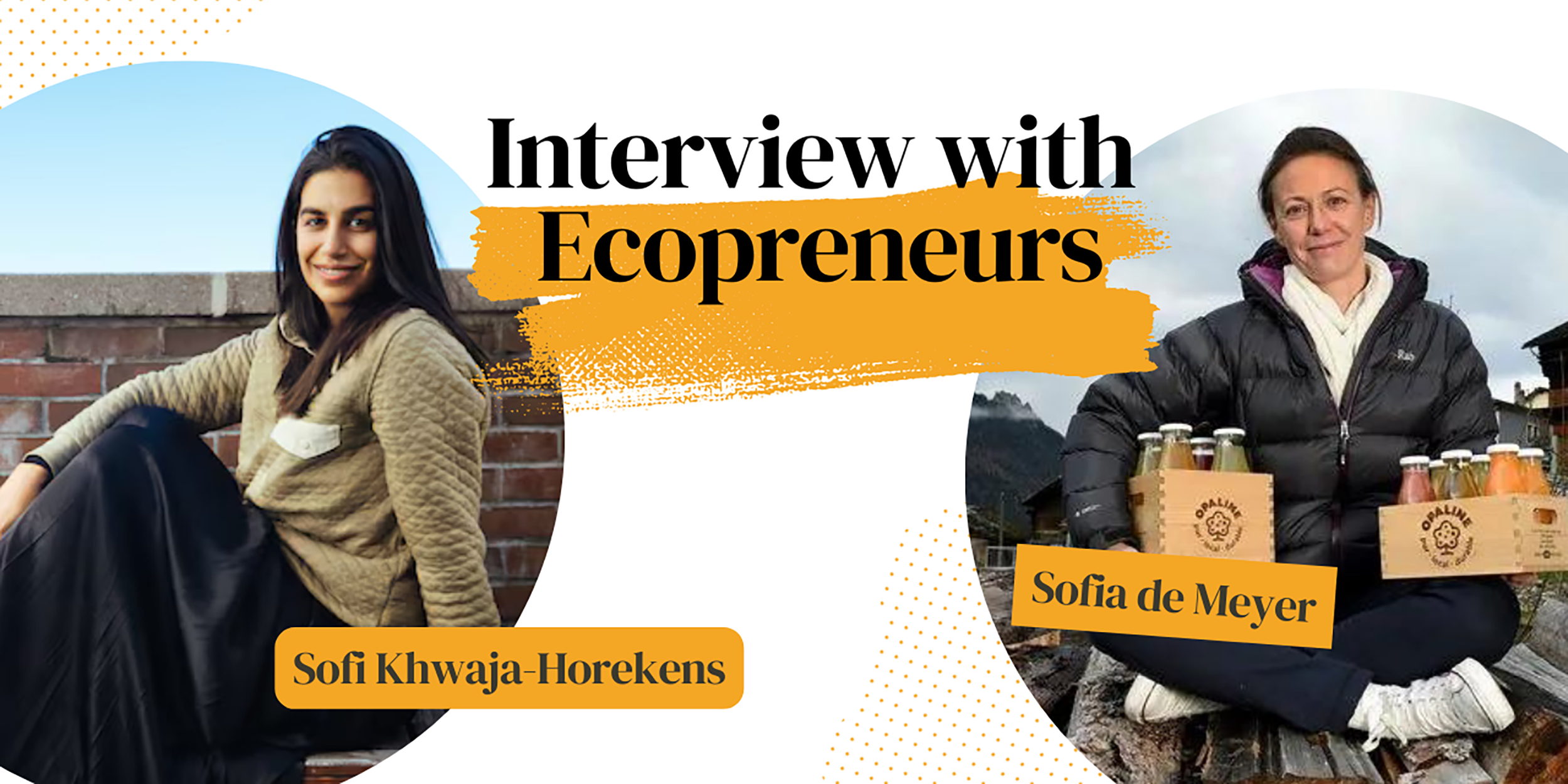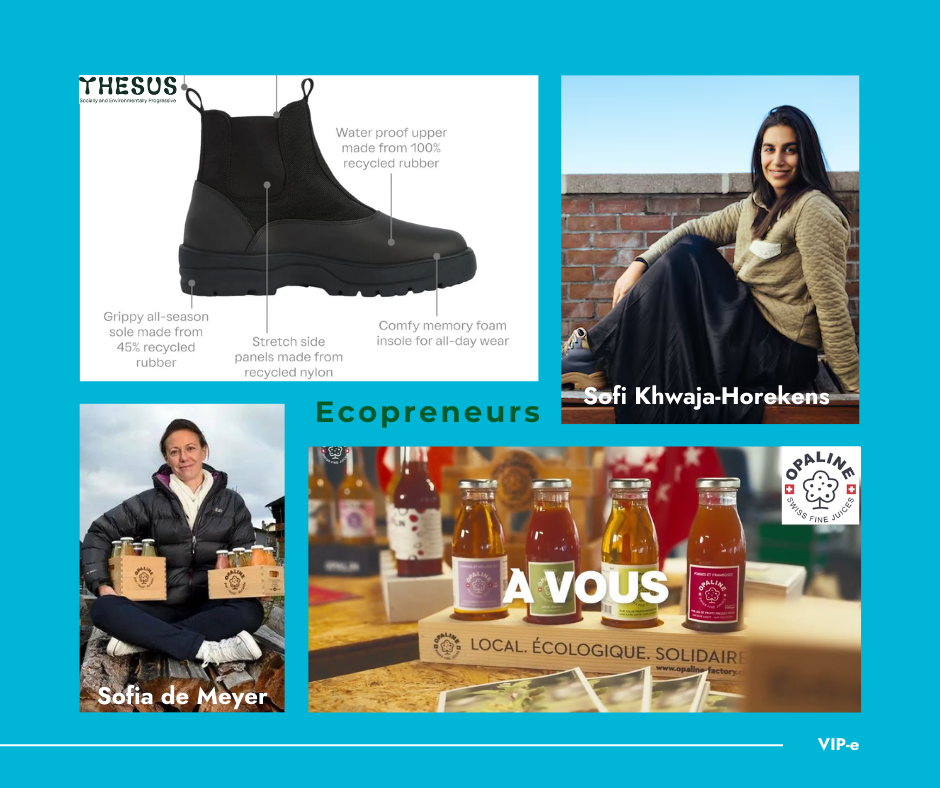Sofia Khwaja, Chief Executive Officer at Thesus; Sofi de Meyer, Founder of Opaline Factory
What inspired you to become an ecopreneur, and how did your journey begin?
Sofia - My journey started with a blank sheet of paper and an immense curiosity, and trust, in this space of unknown. In this space, I took the time to observe, and be inspired by nature. The idea emerged for my first business (www.whitepod.com) which I realized one step at a time, adjusting and growing at a pace which allowed the integration of a great variety of stakeholders, nature included.
Sofi - At an early age I had a strong sense of purpose, curiosity and a deep connection to nature and people of different stripes and walks of life. This was instilled by my parents, an open-minded and nature-centered education, and the incredibly diverse context that we lived in. I’ve also always been a big-picture person, genuinely excited by challenge and complexity. I’m not really sure where this came from…probably from a very rebellious spirit that didn’t take well to the word “no” or “it's not possible”.
What excites you the most about teaching in the Villars Intensive Program on Ecopreneurship this summer?
Sofia - Sharing all that I would have loved to know when I started my journey of ecopreneurship over 20 years ago.
Sofi - Young people are unafraid to think creatively and critically, take risks, and challenge the status quo. We often unlearn much of this as we get older. Teaching in the VIP-e program this summer is an exciting opportunity to help channel and mobilize this energy toward positive impact.
How do you believe young entrepreneurs can influence the future of sustainable business?
Sofia - By being intuitive, inclusive, creative and open to an entire new scope of vision. The blank sheet of paper.
Sofi - Young entrepreneurs have a unique perspective, often left out of dominant systems and frameworks; they have the appetite to re-imagine a more just and inclusive future; and, there is an immense amount of native and open-sourced technology at their disposal, helping to free up some of the costly administrative and structural burdens, allowing for thoughtful design and creativity to be at the forefront of innovation. I also believe young people are more informed and connected than ever before. This facilitates an unprecedented opportunity for collaboration that can fuel innovation and impact - in the past, this was something that was often gatekept behind financial capital as the precursor for mobilization and success.
Thesus is known for its innovative approach to sustainable outdoor footwear. What key lesson from your experience at Thesus will you bring into the classroom?
There are so many things we have learned along the way in building Thesus. The most important thing has been a recognition that entrepreneurship is a collective endeavor, not an individual success as it is made out to be. I hope to help empower future ecopreneurs to turn their vision into action, through the strategic and responsible use of collective resources - nature, capital, energy and design intelligence/technology. This means knowing what you bring to the table and then finding alignment to collectively forge a way ahead toward a common vision - this requires an understanding of self, having foundational and ethical guiding principles, being able to navigate complexity, identify aligned stakeholders while developing a compelling and engaging narrative to galvanize momentum.
Opaline has created a unique niche in the natural drinks market. How important is local sourcing and community involvement in building a sustainable business?
It is not important. It is essential. Local sourcing means not only less impact with transport, but it also allows direct human connection with local farmers and through connection, an understanding of their needs and the value of their work. They are no longer considered as suppliers, with an impact on costs to be optimized on a “value chain”, but as partners with valuable experience which contributes to the quality of the product and the resulting growth in sales. As for the community, sustainable businesses serve their community (and not the opposite). Community is at the very source of the purpose and vision of the business. It sparks the interest for the brand and gives legitimacy to the values it carries. It is also at the very source of R&D. The most precious contribution to our product development came from the mutual trust and recognition we cultivated with our community.
What can students expect to learn from the VIP-e course that they won't find anywhere else?
Sofia - Learning through a variety of interconnected experiences and sharing these experiences in group discussions. All in a unique and deeply inspiring natural setting. These have been the most powerful tools on my ecopreneurship journey. Experiences, when lived and shared, serve creativity and resilience which in turn empowers agility and strong collaborations. All essential ingredients to navigate, and lead, successfully in complex systems.
Sofi - The VIP-e allows for unprecedented access to the entrepreneurial experience. Through in-person mentorship directly with ecopreneurs, students will learn from the ups and downs of our entrepreneurial journeys. The VIP-e program also provides a sense of place for a community of young people with a shared purpose and vision for a better world. Finding connection in nature and inspiration from the breathtaking surroundings of the Swiss Alps. Learning practical skills for entrepreneurship like business case creation and pitch development through lived and immersive experiences. Being at the forefront of thought leadership using new models of systems thinking.
How will the skills taught in the VIP-e help students start their own eco-preneural ventures?
Sofia - By aligning a vision and mission from a shared sense of purpose and developing narratives that enable authentic and long-term collaborations.
Sofi - The hardest part of any new endeavor is starting. We get this out of the way early on in the VIP-e, and then set the foundations for the exciting and impactful journey ahead!




